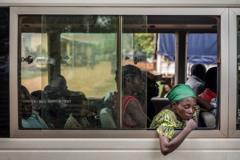Tensions surrounding the U.S. refugee program have escalated, leaving countless individuals stranded as a small group of white South African Afrikaners are welcomed ahead of others. Pacito, a refugee from the Democratic Republic of Congo (DRC), recounts his harrowing experience after his planned flight to the U.S. was abruptly canceled shortly before departure, leaving him and his family homeless in Nairobi. Despite being among 120,000 refugees approved for resettlement, their hopes were dashed when former President Donald Trump paused the refugee program, significantly impacting those in dire circumstances.
Trump's administration has faced backlash for prioritizing the resettlement of Afrikaners, claiming they are victims of "racial discrimination" and "genocide," concepts rejected by many including South African officials. This selective acceptance contrasts sharply with the plight of refugees from other regions experiencing severe violence and persecution. Pacito, critical of the expedited processing for Afrikaners, argues, "It's not fair. We've waited for years."
Domestic and international stakeholders have voiced concern over the administration's approach, calling into question the principles of fairness and equal treatment in humanitarian efforts. As individuals like Pacito struggle to find work and secure a future for their families, others, including the Hammad family from Gaza, share their disbelief at the prioritization of certain nationalities over others, given the ongoing violence they face at home.
The unhindered arrival of Afrikaners evokes frustration from those who have undergone long vetting and medical examinations, and advocates argue that all refugees, particularly those at risk, deserve equal access to safe havens like the U.S. Estimates show that rampant violence continues in the DRC, with thousands affected, while conflicts worsen for Palestinians caught in escalating tensions in Gaza.
Consequently, many refugees face an uncertain future, unable to comprehend the inequity perpetrated through these emerging policies. As Pacito struggles without a home and lacking resources, he underscores the dire need for assistance and a compassionate approach to refugee resettlement that transcends nationality and race. Returning to a conflict-ridden DRC is a prospect he cannot fathom, underscoring the urgency for a more equitable refugee policy in the U.S.




















